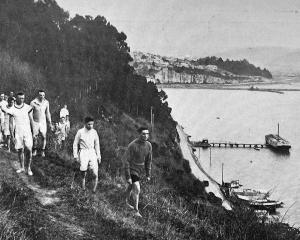There was an emphatic demonstration of great satisfaction when Lady Denman divulged a closely-guarded secret, and announced to the early expectant multitude that the name was Canberra. Up to the last moment room had been left for the fear that the Prime Minister and his colleagues would ask Lady Denman to christian the capital ''Myola''. This despite the fact that authorities on native nomenclature challenged the official allegation that ''Myola'' was a Queensland aboriginal word denoting a meeting place.
What ''Canberra'' means or meant has apparently not yet been ascertained. All that seems to be known is that the locality had this name with the blacks when the first white settlers went there. The Governor-general, Lord Denman, used words of sober, earnest admonition as well as terms which admirably expressed sentiments and ideals appropriate to the foundation of the capital of a continent. It was in truth a memorable, historic event. The newspapers and our public men all said so. But, to tell the whole truth, there was a singular absence of signs of popular interest in enthusiasm. Concern in the proceedings was practically limited to speculation as to what the name of the place would be.
• The publication of a letter from a Territorial at the Yaldhurst camp has occasioned widespread comment and indignation (says our Greymouth correspondent). The correspondent says, inter alia: ''The papers right throughout New Zealand are heralding the glorious feat accomplished by our West Coasters in marching through, yet very little is made public about the treatment meted by the 'exemplary' Defence Department. The rain literally poured down while we tramped the Otira Gorge, and before going five miles we were drenched to the skin. Yet, like gallant West Coasters, we went on bravely with the promise of a 'hot' meal immediately on our arrival at Bealey Flat. We eventually reached Bealey Flat drenched to the skin, and needless to say, with genuine appetites, but we were doomed to still face the troubles, which were already aggravated by marching through creeks knee deep in parts.
''We had to wait exactly one hour and 20 minutes in the pouring rain without shelter for not a `hot' meal as promised, but for a meal of cold meat, bread and tomato salad - certainly a meal creditable to our Defence Department. However, we marched on to meet the public works train, four miles past Bealey Flat, and eventually arrived at Sockburn. We again disembarked and marched eight miles to Yaldhurst arriving at 10.30pm. Some of the gallant 200 were able to obtain supper, but others were less fortunate. We had to sleep in our wet clothes, as the baggage wagons had not arrived - of course, as usual. Today we were again given a sample of the charity of our Defence Department. Being Good Friday one naturally expected fish would find a place on our menu. But no! Three meals of meat were served, and those not desirous of cannibalising themselves by eating meat were promptly told they could do without it, although several complaints were lodged early in the day. Now, sir, why do the defence authorities boast about their `conscience' clause in the Defence Act, when a man is deprived the right of acting up to the conscience clause in camp?'' - ODT. 26.3.1913.
• COPIES OF PICTURE AVAILABLE FROM ODT FRONT OFFICE, LOWER STUART ST, OR WWW.OTAGOIMAGES.CO.NZ












